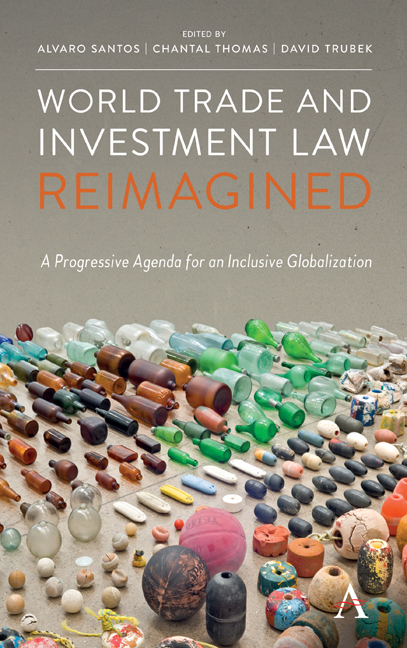Book contents
- Frontmatter
- Contents
- Acknowledgments
- List of Contributors
- Introduction World Trade and Investment Law in a Time of Crisis: Distribution, Development and Social Protection
- PART I RETHINKING THE POLITICAL ECONOMY OF TRADE: COMMENTS ON DANI RODRIK'S STRAIGHT TALK ON TRADE
- PART II SETTING THE STAGE FOR A PROGRESSIVE VISION: EMERGING ISSUES IN WORLD TRADE AND INVESTMENT LAW
- SECTION 1 MAPPING THE NEW CONTEXT FOR TRADE AND INVESTMENT LAW
- SECTION 2 DEALING WITH MAJOR CHANGES IN THE WORLD ECONOMY
- SECTION 3 FRAMING A MORE EQUITABLE INVESTMENT LAW REGIME
- SECTION 4 SUPPORTING DEVELOPMENT
- SECTION 5 REINFORCING SOCIAL PROTECTION: SPREADING THE BENEFITS OF TRADE, DEALING WITH LOSSES AND EXPLORING THE TRADE–IMMIGRATION NEXUS
- Chapter Nineteen Trade Agreements in the Twenty-First Century: Rethinking the Trade–Labor Linkage
- Chapter Twenty The New Frontier for Labor in Trade Agreements
- Chapter Twenty-One Re-embedding Liberalism: Introducing Passporting Fees for Free Trade
- Chapter Twenty-Two Restoring Trade's Social Contract in the United States
- Chapter Twenty-Three Migration and International Economic Asymmetry
- Index
Chapter Twenty-Two - Restoring Trade's Social Contract in the United States
from SECTION 5 - REINFORCING SOCIAL PROTECTION: SPREADING THE BENEFITS OF TRADE, DEALING WITH LOSSES AND EXPLORING THE TRADE–IMMIGRATION NEXUS
Published online by Cambridge University Press: 07 September 2019
- Frontmatter
- Contents
- Acknowledgments
- List of Contributors
- Introduction World Trade and Investment Law in a Time of Crisis: Distribution, Development and Social Protection
- PART I RETHINKING THE POLITICAL ECONOMY OF TRADE: COMMENTS ON DANI RODRIK'S STRAIGHT TALK ON TRADE
- PART II SETTING THE STAGE FOR A PROGRESSIVE VISION: EMERGING ISSUES IN WORLD TRADE AND INVESTMENT LAW
- SECTION 1 MAPPING THE NEW CONTEXT FOR TRADE AND INVESTMENT LAW
- SECTION 2 DEALING WITH MAJOR CHANGES IN THE WORLD ECONOMY
- SECTION 3 FRAMING A MORE EQUITABLE INVESTMENT LAW REGIME
- SECTION 4 SUPPORTING DEVELOPMENT
- SECTION 5 REINFORCING SOCIAL PROTECTION: SPREADING THE BENEFITS OF TRADE, DEALING WITH LOSSES AND EXPLORING THE TRADE–IMMIGRATION NEXUS
- Chapter Nineteen Trade Agreements in the Twenty-First Century: Rethinking the Trade–Labor Linkage
- Chapter Twenty The New Frontier for Labor in Trade Agreements
- Chapter Twenty-One Re-embedding Liberalism: Introducing Passporting Fees for Free Trade
- Chapter Twenty-Two Restoring Trade's Social Contract in the United States
- Chapter Twenty-Three Migration and International Economic Asymmetry
- Index
Summary
The current crisis in trade policy affords an important opportunity to reexamine the quality of consent (and its absence) in trade law and policy today. Consent is an essential, constitutive element in trade— without it, we engage in some form of predation, coercion or exploitation, whether or not we call it “trade.” Consent is not only an element in trade between states, however— it is equally important in understanding the internal political and social bargains political communities make when they undertake trade liberalization policies, or what I call the “social contract of trade.” In exchange for pursuing free trade as a policy, a society has an obligation to compensate those within the polity who are vulnerable to trade's downside risks. One way this social obligation is met is through a collection of specialized labor support policies called trade adjustment assistance (TAA), which in the United States is explicitly linked to securing congressional support for free trade negotiations.
In trade terms, the 2016 US presidential election was a wake-up call for many. A significant element within the US polity feels betrayed by our current trade policies and believes that free trade is being imposed on them for others’ benefits, but at a cost for them. This reflects in part the widely acknowledged failure of TAA as it is currently designed and implemented. To restore trade's social contract, TAA needs to be significantly transformed to guarantee effective retraining, relocation support and adequate wage insurance benefits. Funding for a revamped TAA could come from incorporating a financial transaction tax (FTT) into all trade agreements, which would support domestic adjustment assistance programs. This reform will be an effective way to honor the social contract of trade and make it self-sustaining.
Trade and the “Country within the Country”
The social contract of trade
The social contract of trade involves the decisions we make as a society to pursue a free trade policy and, as part of those decisions, the commitments we make to vulnerable groups within our own society who are at risk when we engage in free trade. The choice to enact a free trade regime forms part of what John Rawls calls the “basic structure of a society”: a set of institutions, policies and practices that fundamentally shape the allocation of social resources and the life prospects of a community's members.
- Type
- Chapter
- Information
- World Trade and Investment Law ReimaginedA Progressive Agenda for an Inclusive Globalization, pp. 233 - 240Publisher: Anthem PressPrint publication year: 2019

